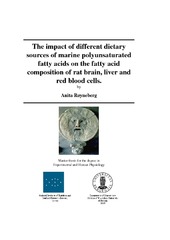| dc.description.abstract | There is a general consensus that the physiological activity of fish oil can be ascribable to eicosapentaenoic acid (EPA, 20:5n-3) and docosahexaenoic acid (DHA, 22:6n-3). However, the form in which they are introduced in diet might affect the rate of incorporation in tissue. The aim of this study was to examine the effects of n-3 polyunsaturated fatty acids (PUFA) of different marine origin and the incorporation of EPA and DHA in rat brain, liver and red blood cells (RBC). Eight dietary groups received different diets, in which six were based on marine resources (rich in n-3 PUFA), differing in the structural form of the fatty acids (triacylglycerol (TAG), phospholipids (PL) and ethyl ester), and two diets were based on vegetable resources (TAG and PL rich in n-6 fatty acids). The marine diets included; salmon, seal oil or cod liver oil all rich in TAG, cod, marine PL, and ethyl esters from commercially available n-3 capsules. After 3 weeks of feeding, animals were sacrificed and tissue fatty acid composition was determined. The fatty acid profile changed profoundly in the liver and the RBC of animals receiving marine n-3 PUFA compared to n-6 diets, whereas the changes in the brain were only moderate. Animals fed the marine diets showed increased levels of EPA and DHA with a concomitant lower level of n-6 fatty acids compared to animals fed vegetable diets. The brain and liver responded to the structural forms of the fatty acids, whereas the RBC responded in a dose dependent matter. The brain, the liver and the RBC differed in their response to the different diets. In conclusion, salmon, seal oil, cod liver oil and marine PL are good sources for increasing DHA levels in brain, whereas the incorporation of EPA and DHA from capsules containing the fatty acids as ethyl esters was poor. | en_US |
